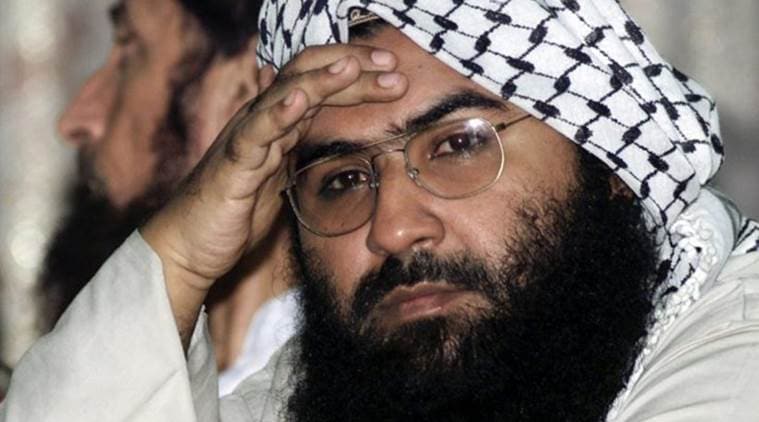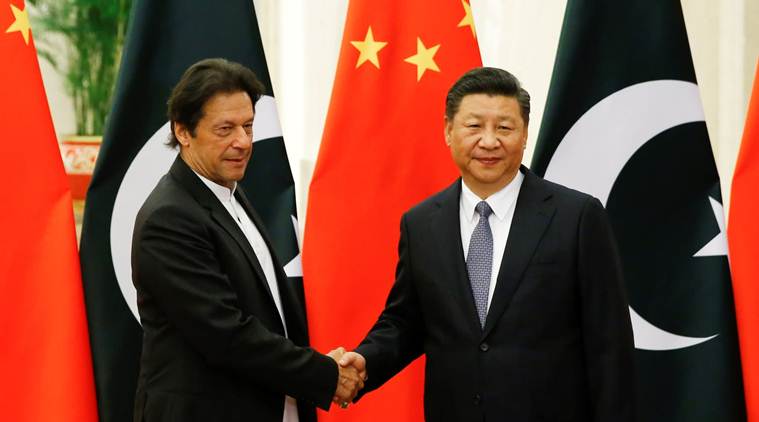by Apurva
 India’s proposal, put forward in February 2016 after the Pathankot attack, to designate Azhar as a global terrorist under the 1267 regime has been blocked four times by China, most recently in January 2017.
India’s proposal, put forward in February 2016 after the Pathankot attack, to designate Azhar as a global terrorist under the 1267 regime has been blocked four times by China, most recently in January 2017.
Soon after a suicide bomber killed 40 CRPF personnel in Jammu and Kashmir on February 14, the Pakistan-based Jaish-e-Mohammad claimed responsibility. The terrorist organisation has carried out multiple attacks on India over the last nearly two decades, but its leader, Maulana Masood Azhar, eludes international sanctions.
The reason is China. Beijing has refused to lift its “technical hold” on a proposal to declare Azhar a global terrorist under UN Security Council Resolution 1267, which prescribes a sanctions regime against designated terrorists and terrorist groups. India’s proposal, put forward in February 2016 after the Pathankot attack, to designate Azhar as a global terrorist under the 1267 regime has been blocked four times by China, most recently in January 2017.
Why is China so keen to shield Azhar, blocking a global consensus at the behest of Pakistan? Its standard line is that it wants to “uphold the authority and validity of the 1267 Committee”. But its real reasons are far less lofty — and range from protecting its “all weather” ally in South Asia to its business interests in the China Pakistan Economic Corridor (CPEC), and from making things difficult for its Asian rival India to making a point to western powers led by the United States.
Where does the CPEC come in?
This is the brightest jewel in Chinese President Xi Jinping’s ambitious Belt and Road Initiative (BRI), which aims to connect Asia, Europe and Africa by building and upgrading road, rail, and sea infra on a massive scale. CPEC runs across the length of Pakistan, linking Kashgar in China’s Xinjiang province to the Gwadar deep-sea port on the Arabian Sea near Pakistan’s border with Iran. Chinese firms have invested close to $40 billion in around 45 CPEC projects, about half of which are nearing completion. China is determined to protect this gigantic investment of money, personnel and time. Access to the sea through Gwadar will remove the need for it to take the long route west through the Straits of Malacca and around India, and dramatically increase its proximity to the oil shipping lanes through the Strait of Hormuz.
Good relations with Pakistan, and international protection for ISI proxies like Jaish provide China with insurance against terrorist attacks on CPEC infrastructure and the thousands of Chinese working on them. The project has been targeted by Baloch separatists as well as the Pakistani Taliban, who have claimed to be protesting China’s treatment of its Muslim Uyghur minority in eastern Xinjiang. Pakistan has attempted to reassure Beijing on the security of CPEC. In 2015, it established a 20,000-personnel Special Security Division drawn from the Army and paramilitary forces, and headed by a Major General-rank officer, exclusively to secure CPEC in addition to the local police. President Xi Jinping with PM Imran Khan in Beijing last November. (Reuters Photo)
President Xi Jinping with PM Imran Khan in Beijing last November. (Reuters Photo)
 President Xi Jinping with PM Imran Khan in Beijing last November. (Reuters Photo)
President Xi Jinping with PM Imran Khan in Beijing last November. (Reuters Photo)
But if security has been provided, why does China still not budge on Azhar?
China has had a tacit understanding with the Afghan Taliban from the days of their predecessors in the 1970s, said Prof Srikanth Kondapalli of the Centre for East Asian Studies at JNU’s School of International Studies. The Chinese military had trained the mujahideen against the Soviets, and China subsequently made a deal with the Taliban (many of whom, including Mullah Omar, were former mujahideen commanders) that “as long as they don’t support the Uyghurs in Xinjiang, they won’t harm them”. This deal, Prof Kondapalli said, is still on: “Don’t train the Uyghurs and we won’t interfere.”
Nearly 10 years ago, a top leader of the Islamist Uyghur East Turkestan Islamic Movement who was allegedly involved in a bombing in Xinjiang was tracked to Pakistan, which handed him over to Beijing. “Compare this with Pakistan’s response to India’s demands that it hand over terrorists wanted in India,” Prof Kondapalli said. “Broadly this is the situation.”
On Azhar, China insists there isn’t enough evidence to designate him a “global terrorist”, though the rest of the P5 believes otherwise. “China takes a different position because of the larger understanding it has with such organisations… as long as you don’t disturb me, we will not penalise you. If you are expanding your international base, it must not be at my expense. That’s China’s attitude,” he said.
Also, China enjoys overwhelming popularity on the street in Pakistan — surveys show 88% Pakistanis view China favourably, compared with only 33% Indians. It is not in Beijing’s interest to disappoint this constituency by giving in to India’s repeated demands to list Azhar. China, experts said, remains conscious that relations between Pakistan and the US had been strongly impacted by the killings, first by al-Qaeda of American-Israeli journalist Daniel Pearl in 2002 and then, by US special forces of Osama bin Laden in 2011.
Does China’s stand have to do with India’s emergence as a competitor?
Yes. India is part of a short list of economic giants who have refused to participate in the BRI. New Delhi’s opposition stems from the CPEC, which runs through Pakistan-occupied Kashmir. And since China views India as a competitor, Beijing looks to tie down New Delhi to South Asia using issues like Azhar. By supporting Pakistan on UNSC Resolution 1267 and blocking India’s entry into the Nuclear Suppliers Group by tying its bid to Pakistan’s, China seeks to needle and frustrate India. Such tactics are also intended to send out a message to the US, which seeks to build a relationship with India to contain China in the Indo-Pacific.
Has this always been China’s position?
Before Azhar, Beijing had blocked on three occasions India’s moves to designate Jamaat-ud-Dawa chief Hafiz Saeed as a terrorist. But in 2008, as global outrage intensified in the aftermath of the 26/11 attacks, Beijing was forced to back international action against Saeed. But 26/11 was an extraordinary attack; it remains to be seen if India can drum up enough international support over Pulwama to push China on Azhar.
Is there a reason for Beijing to budge?
Not budging on Azhar will probably not directly affect China’s bilateral ties with India. But Beijing may have to contend with the abstract impact of a shift in public opinion. The gains from last year’s Wuhan Summit may dwindle if public opinion turns against China. “This time, it is not really defensible… they (Jaish) have said they were involved. China’s image will take a beating and the Indian public will have an increasingly negative view of China,” Prof Kondapalli said.
State Councillor and Foreign Minister Wang Yi was in India in December for the high-level people-to-people and cultural exchange mechanism. “They want to sell the China story and tap the Indian consumer market… this may boomerang. In diplomacy, this cannot be quantified, but it is very significant,” Prof Kondapalli said.
If India does want to raise the pitch against China, it could begin by taking a page from America’s playbook and initiate action against Chinese companies like Huawei. “It will not affect India-China ties, but the overall talk about China in India will reduce. With the negative public opinion, there may be restrictions on some companies, like what (US President) Trump did,” he said.
No comments:
Post a Comment